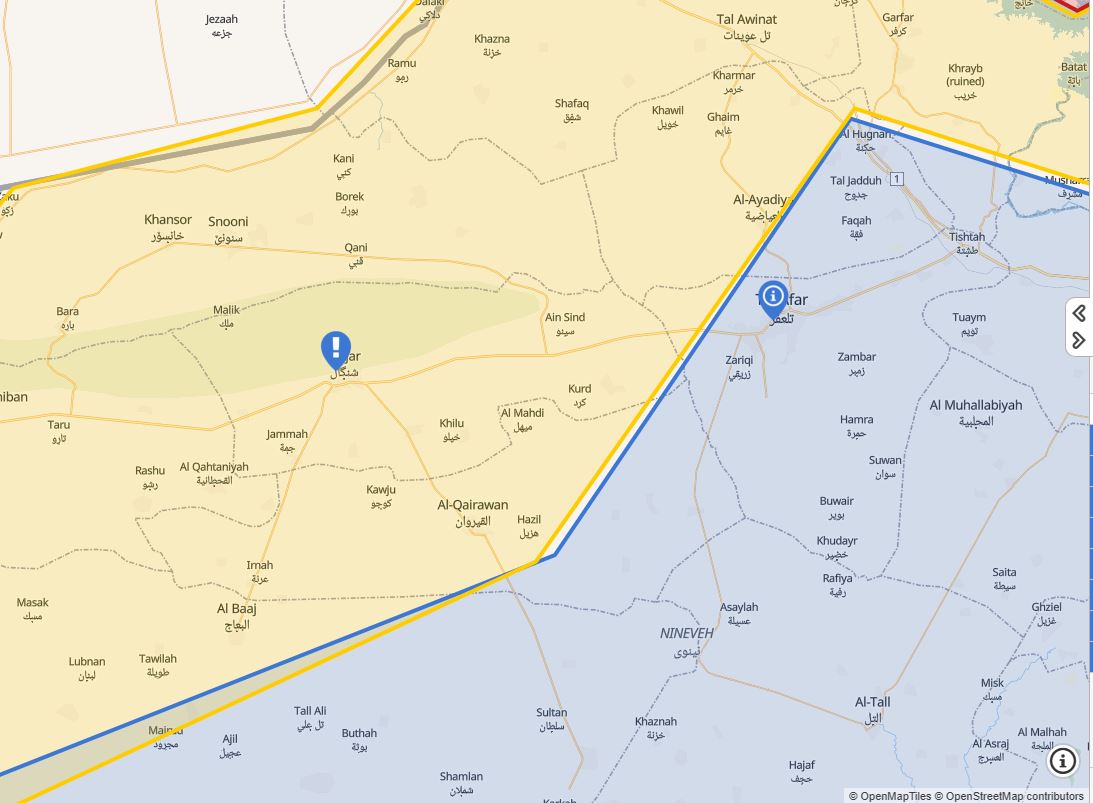1.1K
Kirkuk
- On April 23, three citizens were kidnapped by ISIS (Da’esh) in Wadi Zaghaytun, west of Kirkuk, while they were fishing. The next day, two of the kidnapped were released, and the fate of the third remained unknown. Immediately after the incident, security forces launched a search operation to find the third person. On April 25, the third hostage was released without details of his release. In recent years, Da’esh terrorists have been generating income by kidnapping shepherds and fishermen and releasing them for ransom. Separately, On April 27, Kirkuk police announced the arrest of a terrorist who tried to blow up a motorcycle in Panja Ali market on the evening of Eid. Kirkuk police released photos of the arrest of the terrorist, a large number of weapons and ammunition were seized from the hideout.
- On April 22, a US drone crashed in southern Kirkuk. Media outlets close to Iranian-backed militias near Daquq claimed they shot it down. Meanwhile, a video released on social media claimed US military helicopters struck the debris of the drone to prevent it from falling into the hands of Iranian-backed militias. However, a statement by Operation Inherent Resolve read that the drone “experienced a mechanical failure” and the Iraqi Security Forces (ISF) “secured the crash site, while Coalition service members cleared the area with a controlled detonation.”
- On April 28, Iraqi Oil Minister Hayyan Abdul Ghani told the Iraqi News Agency that Kurdistan’s oil exports would “resume soon”. The resumption of Kurdistan oil exports also means the resumption of Kirkuk oil exports. Although Kirkuk oil exports are controlled by the Iraqi government, they are exported through the Kurdistan oil pipeline. Kirkuk oil exports to the Turkish Cihan Pipeline have been suspended since March 22 and to Jordan since March 31. Iraqi losses due are nearly a billion dollars since a Paris court ruled in favor of Iraq against independent Kurdish oil exports.
- On April 23, Fahmi Burhan, head of the Kurdistan Regional Government’s (KRG) Kurdistan Areas Board, held a press conference stating that what was happening in Palkana village was a clear violation. “We expect the Iraqi government to put a limit on the incidents in Palkana village and not to repeat them,” he said. Burhan said that armed attacks and threats will not heal the wounds, and the Kurdish citizens of these areas will not remain silent about these actions. He stressed that neither the Iraqi government nor the Kurdistan Region would benefit from these events, and that they were only in the interest of terrorists. Three people were injured in a clash between Arab and Kurdish citizens in Palkana village of Sargaran district in western Kirkuk on the first day of Eid al-Fitr when Arab settlers attacked Kurdish residents and attempted to occupy their lands and homes.
Shingal (Sinjar)
- On April 23, Vian Dakhil, a Yazidi lawmaker of the Kurdistan Democratic Party (KDP) said: “It is difficult to make Sinjar a province due to the decision of the Council of Ministers to make Tala’afar a province. Vian Dakhil made these remarks during a Yazidi Forum for Dialogue, which was held on April 23 in Erbil. Dakhil said, “The Council of Ministers has decided to turn Tala’afar into a province. Due to the proximity of the two cities, which are 60 kilometers apart, it is very difficult to turn Sinjar into a province.” In early 2014, the Council of Ministers initially approved the conversion of the Tala’afar district into a province, but the decision has not yet been implemented.
- On April 27, for the first time since the Da’esh Genocide against the Yazidis in 2014, a number of Arab families returned to the center of Sinjar district. Yazidi citizens held protests against the return of the Arab families. According to the demonstrators, the families are Arab settlers from the Ba’ath regime who collaborated with Da’esh terrorists during the genocide of the Yazidis. The incident escalated into chaos and fighting. The Kurdistan Islamic Union (KIU) said in a statement that Yazidi demonstrators attacked the Rahman Mosque in the center of Sinjar and tried to destroy it. The Rahman Mosque was demolished during the fight against Da’esh, but on April 14, the Sunni endowment in Sinjar announced its restoration. In response to the statements by the KIU and other Islamist parties, Mir Hazim Tahsin Beg, the spiritual leader of the Yezidis of Kurdistan and the world, denied that any mosque was attacked and said, “This is not in the character of the Yazidis and when the Yazidis were displaced, the doors of their mosques were opened to them in Kurdistan.” He warned that “No one should exploit this issue for chaos and turn it into sedition between Muslims and Yazidis.” Meanwhile, the security forces in Sinjar denied any attack on the Rahman Mosque or any other mosque and denied the reports. The Ministry of Endowments and Religious Affairs in Kurdistan said in a statement that the attack on the Mosque in Sinjar is “personal” and has “nothing to do with any religion.” The Kurdistan Islamic Religious Scholars Union (KIRU) strongly condemned the attack, calling it an insult and a destructive act. A video released by the Sinjar police confirmed there was no attack on the Mosque.

